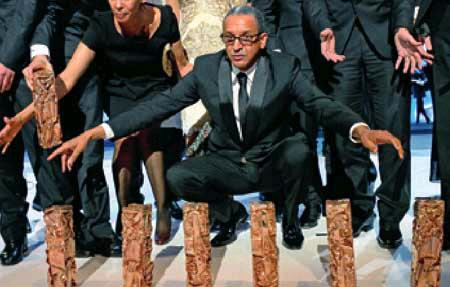Dignity in Adversity
2016-05-16ByRachelRichez
By+Rachel+Richez

Is there an audience for a Mauritanian direc- tor promoting a movie about Mali in China? It depends on the director and the film. French speakers, film students and film lovers packed the China Film Archive auditorium to watch Abderrahmane Sissakos film Timbuktu with the director himself.
In 2015, Timbuktu was nominated for the Best Foreign Language Film at the Oscars. The same year, it won seven Cesars, the French Oscars, with Sissako becoming the first African director to win the best director trophy. The movie has moved critics around the world with its sensitive depiction of the incursion of jihadists in the Malian city of Timbuktu in 2012. Its screening launched the 2016 Francophonie Festival in Beijing, followed by a discussion between Sissako and award-winning Chinese Director Yang Chao. The French film festival was held from March 11 to 29, touring 19 more cities in China.
Faced with Islamic fundamentalism, Timbuktu tried to resist. The movie tells the story of this peaceful resistance through acts of defiance. In spite of the ban on music, the char- acter portrayed by singer Fatoumata Diawara continues to brighten the nights in the city with her incredible voice. After football is prohibited, the children continue to play with an imaginary ball, running and scoring goals with their joy undiminished. At the market, a fish seller rebels against the jihadists new laws forcing women to wear gloves outside their home. “Wear gloves to sell fish?” she says indignantly. “How can I water them with gloves? Our parents raised us honorably. Without gloves. Enough! You want to chop off our hands? I have two. Cut them off!”
The power of those scenes came from their closeness to reality. The director had met victims of the jihadist rule in Mali and listened to their stories, feeling their pain. “I didnt build a backdrop, I didnt create characters, I didnt imagine any particular costume. I depicted Africa as it is, beautiful and strong. And those brave women too,” Sissako told ChinAfrica, a monthly magazine published by Beijing Review in English and French.
The film shows the terror of violent extremism. The audience witnesses the stoning of an unmarried couple and follows the journey of a mother trying, in vain, to save her daughter from a forced marriage. They also meet the beautiful Diawara again, this time veiled and kneeling, paying the price for her passion for music as she is subjected to a whipping. But the whip does not stop her. On the contrary, she sings bravely in rhythm with the lashes that rain down on her.
In spite of the brutality of the situation, the director decided not to demonize the intruders. Showing their humanity allowed Sissako to brilliantly reveal their contradictions: they hide to smoke, talk about football and dance when alone when all three are banned in their regime. The absurdity of the situation contrasts with the violence of their actions.
The beauty of the images stops the audience from looking away. The disturbingly quiet desert accentuates the poetic atmosphere created by the director. The movie starts with the shooting of a gazelle trying to escape the jihadists gunfire, a symbol of freedom attacked and downed.
“Its a good movie because it will raise awareness and explain to young Mauritanians what is jihadism,” said a member of the audience, Ismaila Sow, excited to meet his famous fellow countryman.
Even though Timbuktu was freed from the jihadists by French and Malian troops in 2013, the region continues to be under attack from various militant groups. Incidentally, the movie was shot in Mauritania, under army protection. Together with Waiting for Happiness (2002) and Bamako (2006), the filmmaker keeps on showing a strong Africa.
“In spite of the difficulties, I still want to show a dignified continent standing straight,”Sissako told ChinAfrica.
China-Africa relations interest Sissako, who is presently working on a movie between the two regions. A “love story,” confessed the director. “I think China brings a lot to Africa, and Africa brings a lot to China, so I have a positive view. I know there are many Chinese living in Africa and Africans are starting to live in China. These relations are not always easy but they are irreversible.”
